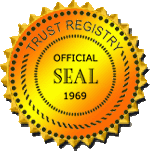Family Living Trust
Trust DefinitionA "trust" usually means a "living trust" or "family trust" or "revocable living trust" or any combination of those words. These trusts are the standard basic trust that usually costs around $500.00. A simple trust and a will are the basis for estate planning and should be the starting point in any estate plan.Simple Estate PlanningA trust, as well as a will can be short, simple, and in plain language. Remember... anything is better than nothing. You can start with the free forms atTrust Forms, or with other free forms at Trust Quote. First, a trust, as well as a will; does absolutely nothing while you are still alive. It's simply a standby document that installs the new controller upon your death, and sets out who, what, where, when, and how assets are to be controlled when you are deceased. Second, a trust usually shelters you from court control over your assets. Otherwise upon death, the court initiates a probate over your assets, wealth, and control over your estate. Literally, probate is the process of "proving" your will (or none) and transferring remaining assets to your heirs. It's well worth the time and effort to bypass probate, for these reasons:
That's where the trusts come in. In essence, once you transfer assets into the trust, they're controlled by the trust (that is controlled by you). At your death, the assets stay in the trust, to be distributed by the trustee (that you selected), rather than by the probate court or government administrator. Distributions, for example, can go to your heirs right away, without the delays of probate.  A formal trust makes it very difficult for a disgruntled heir (or would-be heir) to challenge your disposition of assets. Another benefit is privacy. Your assets and their disposition are not exposed to the general public, as they are when assets go through probate.
A formal trust makes it very difficult for a disgruntled heir (or would-be heir) to challenge your disposition of assets. Another benefit is privacy. Your assets and their disposition are not exposed to the general public, as they are when assets go through probate.
Trusts and wills can be changed. You can change controllers, beneficiaries, assets, distributions, or conditions. You can change the terms whenever you want even cancel the trust altogether. You can set up a revocable living trust naming yourself as trustee as well as beneficiary. You can even give it all to charity, or just cancel the trust. You will, of course, name a successor trustee and successor beneficiaries to manage and receive the trust assets after your death. In the meantime, you have full control of the assets, just as you did before creating the trust. If you transfer stocks into the trust, for example, you can buy or sell them at will. You will receive the income from any trust assets; however, you'll owe the resulting income taxes. The bottom line: With a will and a standard trust, you have control over your assets while living. You can name who gets what at your death, and you can change your mind if you want to. The Private Asset TrustOur Private Asset Trust includes the selected benefits, and has the most flexibility.See more...
The Protection Book for Planning, Protection, Privacy!Copyright © 1995 -
 
|